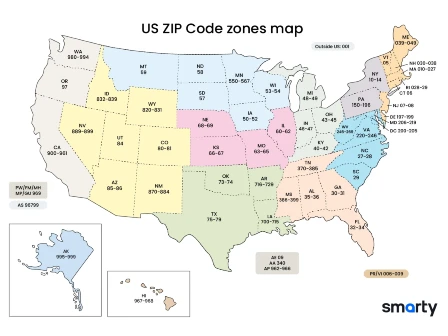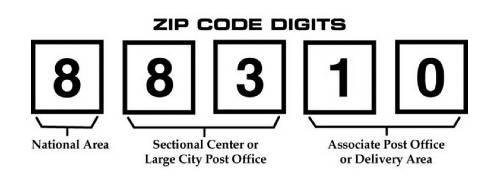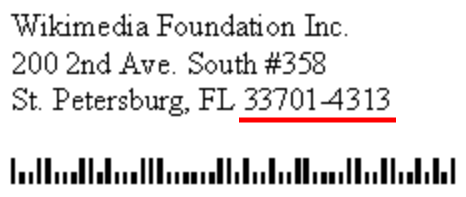ZIP Code™ lookup - What are ZIP Codes & how to find them

A ZIP Code is a 5-digit number that specifies an individual destination post office or mail delivery area. ZIP Codes determine the destination of letters for final sorting and delivery. Each ZIP Code designates a collection of delivery routes used by mail carriers and areas serviced by the USPS.
The term "ZIP" in ZIP Code stands for "Zone Improvement Plan."
ZIP Code Lookup | What Is My ZIP Code?
It’s easy to perform a USPS ZIP Code lookup. Choose an option below for those asking, "What is my ZIP Code?"
| Lookup ZIP Code for an address | Lookup ZIP Codes by city name | Lookup city names by ZIP Code |
|---|---|---|
In this article, we'll cover:
- ZIP Code lookup | What is my ZIP Code?
- What is a ZIP Code, and how do ZIP Codes work?
- How to read a ZIP Code
- ZIP Codes are lines; not shapes
- ZIP+4 Codes - The next generation
- TL;DR
What is a ZIP Code, and how do ZIP Codes work?

ZIP Codes are 5-digit numbers developed by the United States Postal Service to represent individual post offices across the United States. "ZIP Code" is the name of the postal code system for the United States. Like the US, most countries have their own postal code system names.
For example, India calls its postal codes ‘Postal Index Numbers,’ and The Czechia calls theirs ‘Postal Routing Numbers.’ So, when you hear ‘Eircode,’ think ‘Ireland,’ and ‘ZIP Code,’ think ‘The United States.’
There are three main parts of the 5-digit ZIP Code—the national area, the region or city, and the delivery area. The United States Postal Service (USPS) has segmented the country into 10 ZIP Code areas. Starting in the northeast, they are number 0-9. The image in this section is a ZIP Code map of all 10 US postal zones or regions.
The first digit of the ZIP Code allocates as follows:
| ZIP Codes beginning with | States / territories |
|---|---|
| 0 | Connecticut, Massachusetts, Maine, New Hampshire, New Jersey, Puerto Rico, Rhode Island, Vermont, Virgin Islands, Army Post Office Europe, Fleet Post Office Europe |
| 1 | Delaware, New York, Pennsylvania |
| 2 | District of Columbia, Maryland, North Carolina, South Carolina, Virginia, West Virginia |
| 3 | Alabama, Florida, Georgia, Mississippi, Tennessee, Army Post Office Americas, Fleet Post Office Americas |
| 4 | Indiana, Kentucky, Michigan, Ohio |
| 5 | Iowa, Minnesota, Montana, North Dakota, South Dakota, Wisconsin |
| 6 | Illinois, Kansas, Missouri, Nebraska |
| 7 | Arkansas, Louisiana, Oklahoma, Texas |
| 8 | Arizona, Colorado, Idaho, New Mexico, Nevada, Utah, Wyoming |
| 9 | Alaska, American Samoa, California, Guam, Hawaii, Marshall Islands, Federated States of Micronesia, Northern Mariana Islands, Oregon, Palau, Washington, Army Post Office Pacific, Fleet Post Office Pacific |
How to read a ZIP Code

Here is a ZIP Code example. After the first number in a ZIP Code is assigned based on the National Area, the USPS assigns the next two numbers according to a city. The USPS often assigns the first ZIP Code to a region's main town or city. After that, the ZIP Codes will proceed alphabetically.
The first three digits of a ZIP Code together usually indicate the central mail processing facility, also referred to as a sec center or sectional center facility to which that ZIP Code belongs. This facility is the mail sorting and distribution center for a zone or area. Some sectional center facilities have multiple three-digit codes assigned to them. For example, the Northern Virginia sectional center facility in Merrifield is assigned ZIP Codes beginning with 220, 221, 222, and 223.
The fourth and fifth digits of the ZIP Code represent the area of the city or town. For example, if a letter is received with a ZIP Code of 47722, the USPS can know that it's in Indiana (4), it's in Vanderburgh county (77), and it's in the area of the University of Evansville (22).
ZIP Codes are lines; not shapes
ZIP Codes aren't drawn according to state boundaries. In fact, since they are designed only to increase mailing efficiency, ZIP Codes can and do cross county and state boundaries. For example:
- 42223 spans Christian County, Kentucky, and Montgomery County, Tennessee.
- 97635 includes portions of Lake County, Oregon, and Modoc County, California.
- 51023 and 51001 are in both Iowa and Nebraska.
Although most ZIP Codes can be roughly assigned to a geographic area, ZIP Codes do not represent geographic regions. ZIP Codes denote street address groups or delivery routes. Because of this, ZIP Code "areas" can overlap, be contained within another ZIP Code, or have no geographic area. For example, ZIP Codes that start with 095 are assigned to the Navy and therefore have no geographic location.
Similarly, areas without regular postal routes (rural route areas) or areas with no mail delivery (undeveloped areas,) are not assigned ZIP Codes. They are based on sparse mail delivery routes, so the boundary between ZIP Code areas there is indefinite.
You can see our instructions on how to find a county by ZIP Code. In cases where ZIP Codes cross county lines, Smarty displays the default county in the line labeled ‘County Name’ and includes an additional line labeled ‘Alternate Counties.’
ZIP+4 Codes - The next generation
In 1983, the USPS moved to the next generation of ZIP Codes and changed its system to include the new ZIP+4. A ZIP+4 Code uses the basic five-digit code plus four additional digits for a full 9-digit ZIP Code. The full ZIP Code identifies a small mail delivery segment such as a street, a city block, a group of apartments, or even an individual street address that receives a high volume of mail. The ZIP+4 Code is not required and is usually calculated automatically when the mail is sorted and processed. ZIP+4 Codes look like this:

As a rule, each Post Office Box has its own ZIP+4 Code. The +4 on the ZIP Code is often the last four digits of the box number, zero plus the last three digits of the box number, or, if the box number is less than 4 digits, zeros followed by the box number. Since there is this variance, the ZIP+4 Code must be looked up individually for each Post Office Box.
Not all USPS deliverable addresses have a ZIP+4 Code assigned to them. For those postal addresses, geocoding lookups or address validation that require a ZIP+4 may not succeed. Even though the USPS might not provide accurate geocodes for those addresses, Smarty can still provide roof-top level geocodes for most addresses in the US.
You can explore more options by testing the Smarty US ZIP Code API or by reading our ZIP Code API documentation.
Too long; didn't read
TLDR: A “ Zone Improvement Plan” or ZIP Code uses 5 numbers to point to a specific post office or area for mail delivery. Essentially ZIP Codes refer to a particular area serviced by the USPS.